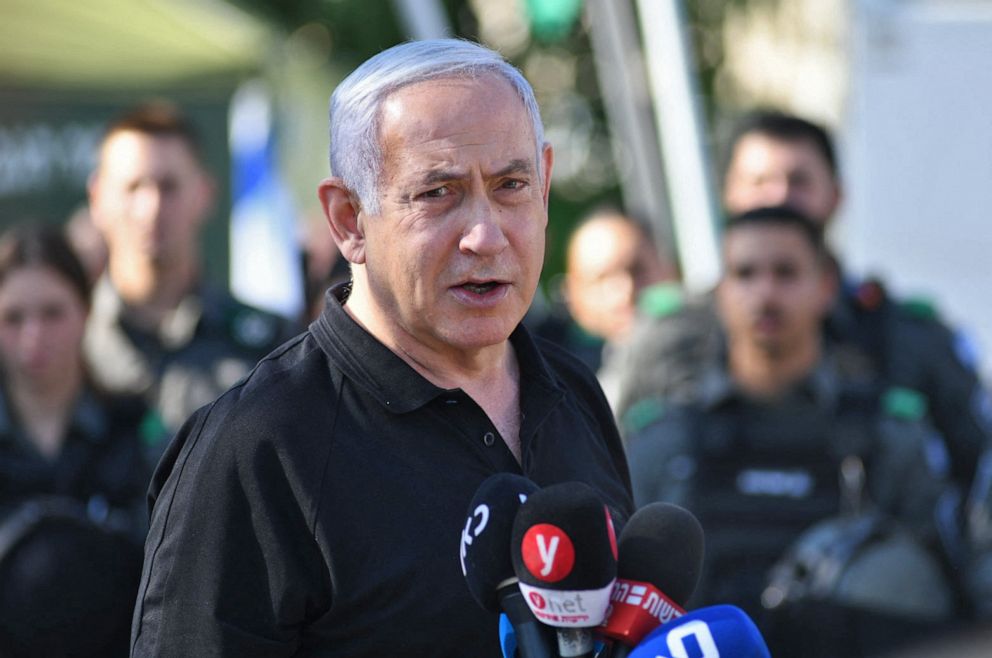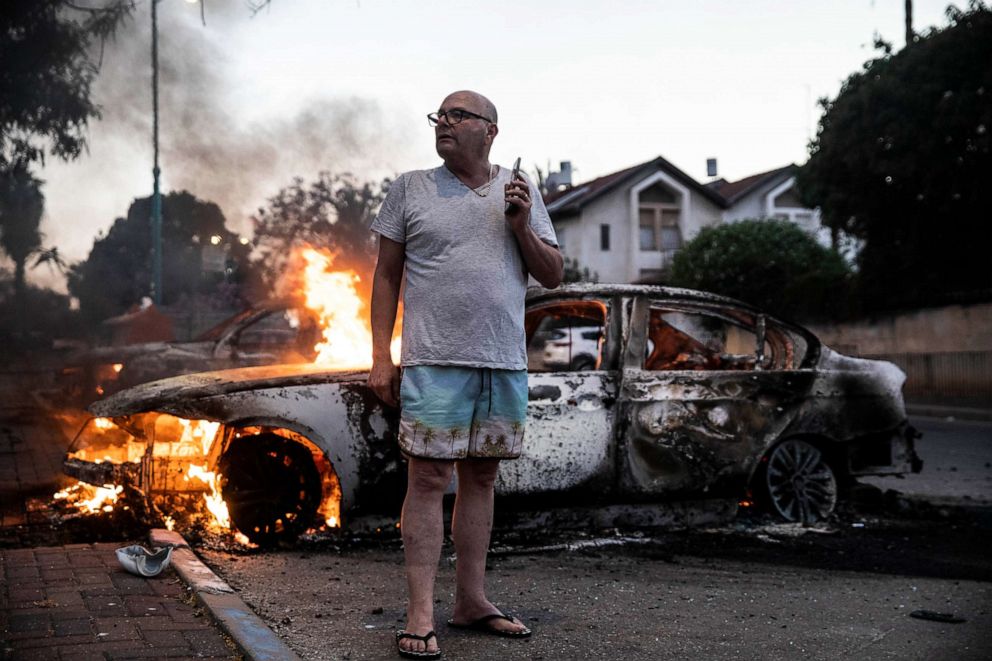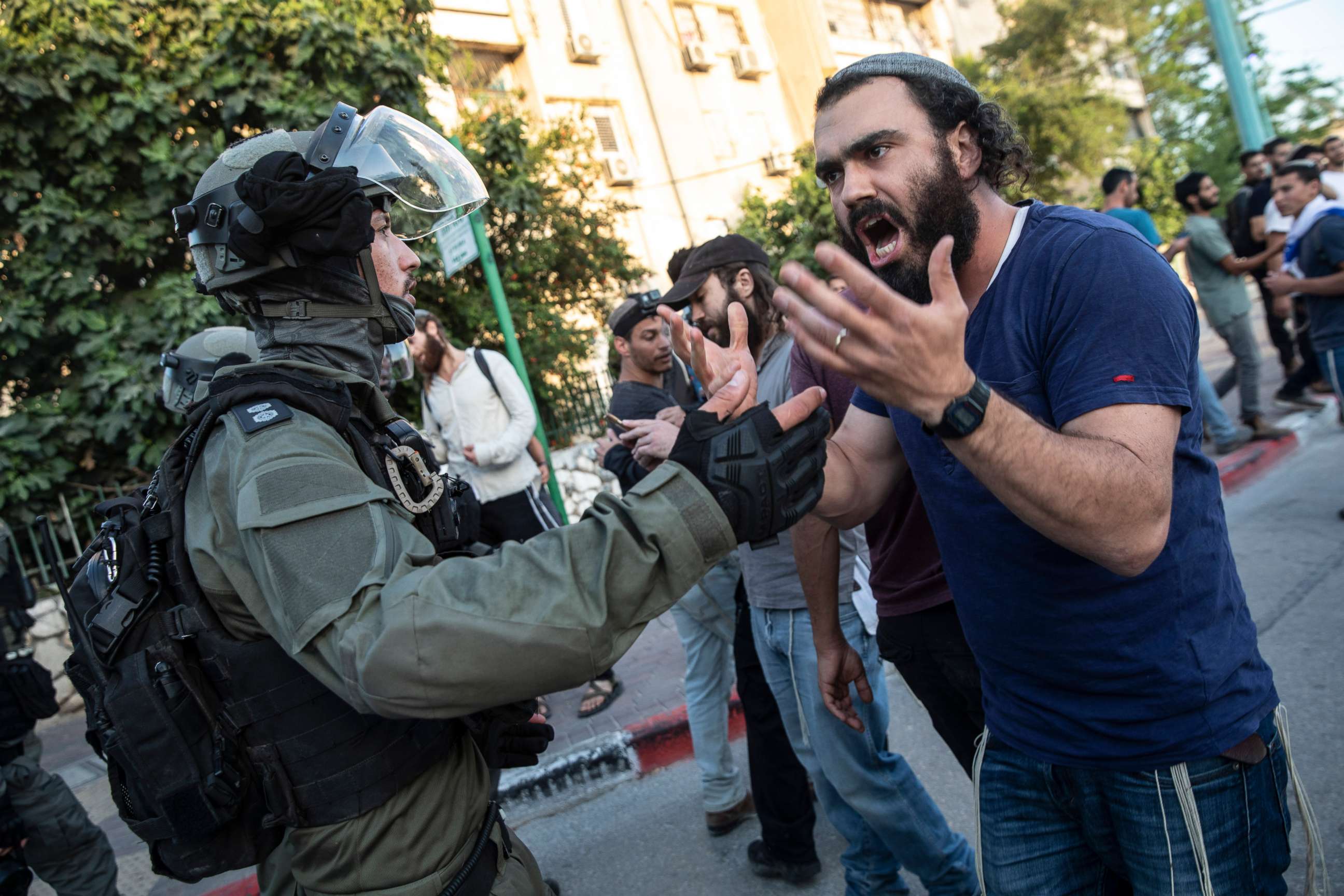Behind the uprisings among Palestinians with Israeli citizenship
Recent laws passed in Israel gave "unique" rights to only its Jewish citizens.
LONDON -- The Israeli government declared a state of emergency on May 12 in the Tel Aviv suburb of Lod after a sudden outburst of rioting by Israeli Arabs, as the hostilities between Israel and Palestinian militants in Gaza escalated.
The growing tension had ignited in Lod two days previously, after a Palestinian citizen was shot dead by a Jewish resident, sparking a wave of violence in the days after his funeral. At least one synagogue and several Jewish businesses were set alight by suspected Arab citizens. Throngs of Israeli Jews threw stones and attacked a car driven by an Arab.
Israeli media reported several instances of these kind of attacks on drivers by both Jewish and Arab suspects. The Israeli President Reuven Rivlin urged calm, warning of a "senseless civil war" between the country's Arabs and Jewish citizens as the violence intensified. The violence led to the death of one Israeli Jew, 56-year-old Yigal Yehoshua, who was hit in the head with a brick.

Arab Israelis are Palestinian by heritage, but Israeli by citizenship, and make up more than a fifth of Israel's population of just over 9 million. Beyond the protests and the instances of violence, in a rare show of unity this week, Palestinian citizens of Israel have also held a general strike across the country involving hundreds of thousands of Arab workers.
Tamar Nafar is a Palestinian with Israeli citizenship. He told ABC News that, in his experience, having Israeli citizenship did not mean equal access to rights in Israel.
"When it comes to poverty, housing, getting permits to build houses, to equal rights when it comes to school education -- everything. We are being treated as worse than second-class citizens," he said.
The policies of Israeli Prime Minister Benjamin Netanyahu have done little to lessen the divide between Arab citizens of Israel who often identify as Palestinians, and the Jewish majority in recent years. Netanyahu has been accused of demonizing Arab voters and their lawmakers for his own political ends. During 2015's general election, in an attempt to turn out his ultranationalist and religious right-wing base, Netanyahu warned that "the Arabs are voting in droves."
The remark was met with outrage and labelled as a dog-whistle which insinuated that Arab Israeli citizens were a threat to the security of the state. After the election, he formally apologized to the Arab-Israeli community for his comments.
The nation-state bill
Israel has long been associated and recognized as the nation-state of the Jewish people but this was not explicitly written into Israeli law until 2018.
Netanyahu drafted a bill that was passed in the Knesset on July 19, 2018. It became the 14th constitutional law of the state of Israel that defined the country as the national homeland of the Jewish people.
The "Nation State Bill" asserts in its first clause that "the right to exercise national self-determination in the State of Israel is unique to the Jewish people," which sparked outrage and condemnation from Israel's Arab community.

The bill was also divisive within the Israeli Parliament, across both Jewish and Arab lawmakers. Sixty-two members of the Knesset voted to pass the bill and 55 opposed it.
Among the clauses, the law asserts that a "united" Jerusalem is the capital of Israel. Palestinians have long claimed East Jerusalem as the capital of their future independent state, a claim that is recognized by most of the international community. The text goes on to say the state will "act to encourage and promote [the] establishment and consolidation" of Jewish settlements. The international community largely views settlements illegal under international law. Former President Donald Trump rejected that in a new U.S. policy, but it's unclear what President Joe Biden will declare.
Critics of the Nation State Bill argued that explicitly granting the right of self-determination as exclusively reserved for the Jewish people was granting rights to one demographic majority at the expense of its minorities (of which there are Arabs, Syriac Christians, Ahmadiyyas, Copts and Armenians among other recognized minorities).
How did Israel's Arab-Israeli Palestinians react to the bill?
As the bill was passed, Arab-Israeli lawmakers tore their copies of the legislation in protest. The leader of a coalition of Arab parties, MK Ayman Odeh, released a statement saying that Israel had "passed a law of Jewish supremacy and told us we will always be second class citizens."
Aida Touma-Sliman, a Palestinian citizen of Israel, is also a member of Knesset of the Hadash Party, part of Odeh's coalition. She argues that the Nation State Law is not the cause of the sudden uprising of Palestinian citizens of Israel, but rather it is a symptom of a greater malaise.
"If you ask any young man who is protesting, they will never mention [that law]. It is the atmosphere behind this law that is the main source of anger. Maybe the young people went to the streets to protest because of [the police tactics on] the Al Aqsa mosque. Or the ethnic cleansing in Sheikh Jarrah, or the airstrikes on Gaza, or maybe because of all of it together. It's the same mentality behind the nation state law," she told ABC News.

Touma-Sliman also takes umbrage at the law making no mention of the ethnic minorities of Israel but enshrining the right of the Jewish diaspora to immigrate to Israel. "So an American Jew is mentioned in the Basic Law of Israel as someone who belongs to the state more than I am, even as a member of the parliament," she said.
Danny Avalon served as the deputy foreign minister of Israel from 2009 to 2013, and dismisses the idea that the Nation State Law has made second-class citizens of Israeli-Arab Palestinians.
He told ABC News that the Nation State Bill was necessary because of rhetoric from Palestinian lawmakers who he describes as routinely undermining Israel, and Israel's identity as a homeland for the Jews.
"For 71 years we didn't think this nationality law was needed," Avalon said. "It doesn't take any civil rights away from citizens but it [legitimizes] the claim that Israel is a Jewish state -- the only Jewish state in the world."
"The rights to the land is Jewish, but the rights in the land are for everyone. There shouldn't be a problem for the Arab Israeli to be a proud Israeli citizen and enjoy all the rights -- as well as the obligations -- in a Jewish land," Avalon added.
The world reacts to the bill
When Israel was established, it was modeled on Western democratic values, but it was also created on a premise of Jewish identity. However, there was never any explicit outlining of what rights were assigned in a Jewish state to its non-Jewish citizens. Israel's Declaration of Independence "ensures ... rights to all its inhabitants", but the language concerning minorities and non-Jews is vague.
Blistering criticism of the new law came particularly from the Jewish diaspora in the U.S. Rabbi Steven Werner claimed in a letter published in Haaretz that "Israel is losing its soul and weakening its democracy and Jewish character."

The European Union also criticized the legislation, which it said complicated efforts to find a two-state solution to the Israeli-Palestinian conflict.
"We are concerned, we have expressed this concern and we will continue to engage with Israeli authorities in this context," Federica Mogherini, then the EU's high representative for foreign affairs and security policy, said at a 2018 news briefing.
Many others agreed that the law put Israel's Jewish identity above its democratic one. But that is missing the point, according to Jerusalem Post editor Lahav Harkov.
"The 13 other Basic Laws are about the trappings of democracy. They're about how our government works, they're about individual human rights. So this is just one about the state being Jewish, as opposed to 13 others about being democratic," she told ABC News.
The experience of Arab-Israelis, some who identify as Palestinians, is not likely to improve in the politically divided atmosphere as Israel struggles to form a government lasting a full term. Politicians including Netanyahu increasingly resort to scorched-earth tactics to mobilize their bases. Israel could potentially be heading for its fifth general election in just over two years.
The journalist Anshel Pfeffer remarked on May 15, five days into the latest escalation of violence: "A week ago Israel was about to have a new government supported by right-wing, left-wing, centrist and Arab parties, which was to concentrate on a 'civilian agenda' and 'reconciliation.' Five days of internecine violence shattered that illusion. It's still Netanyahu's Israel."
ABC News' Nasser Atta and Jordana Miller contributed to this report.



